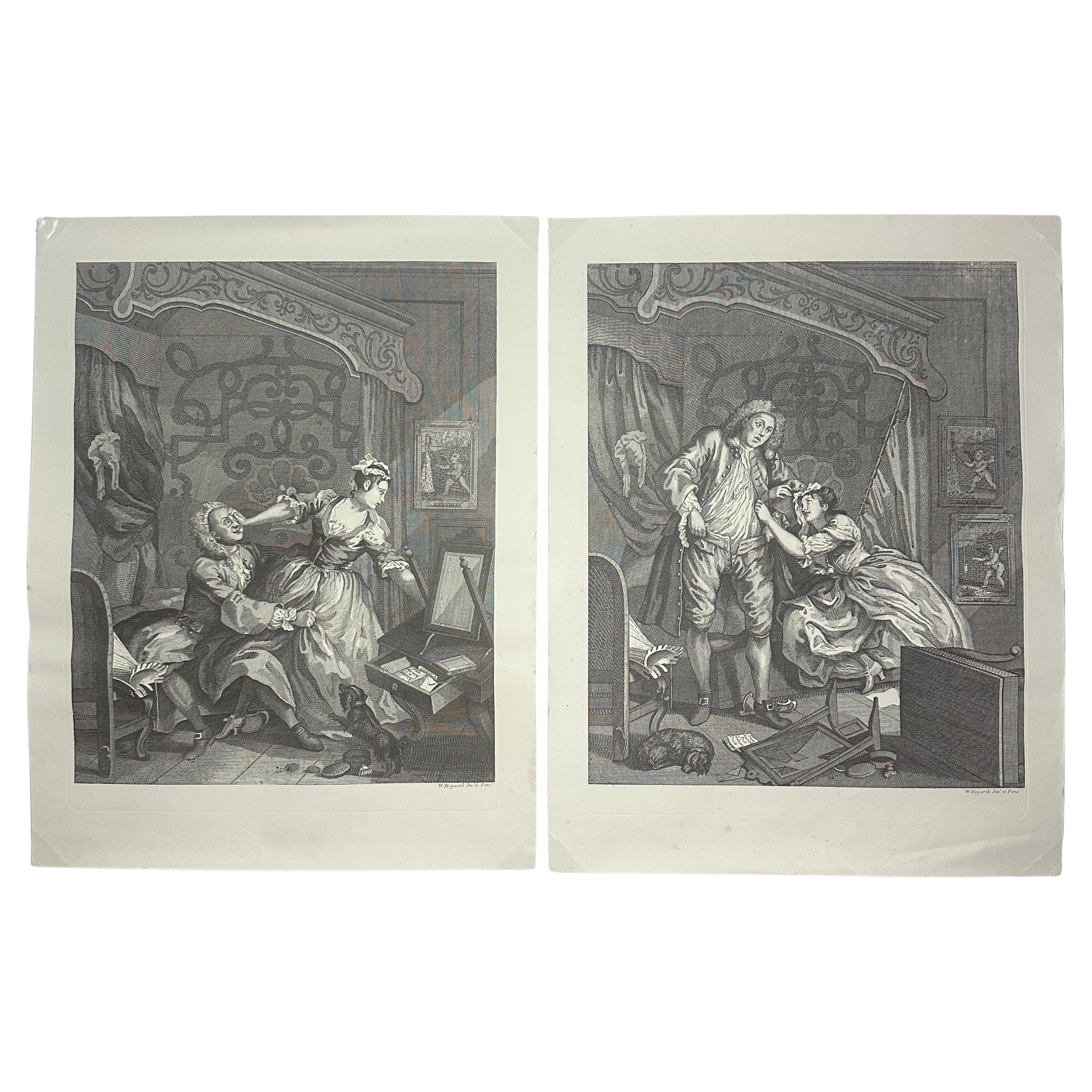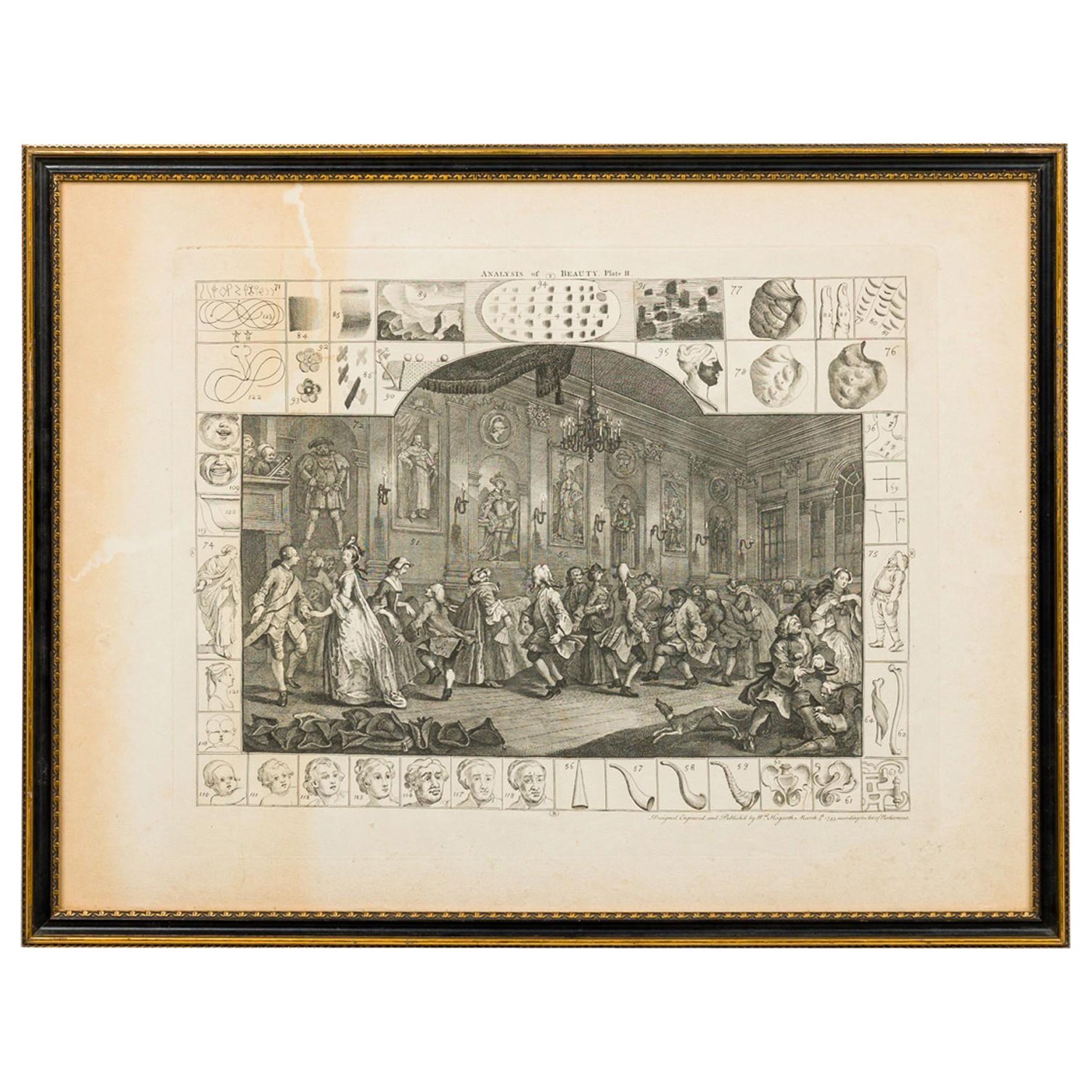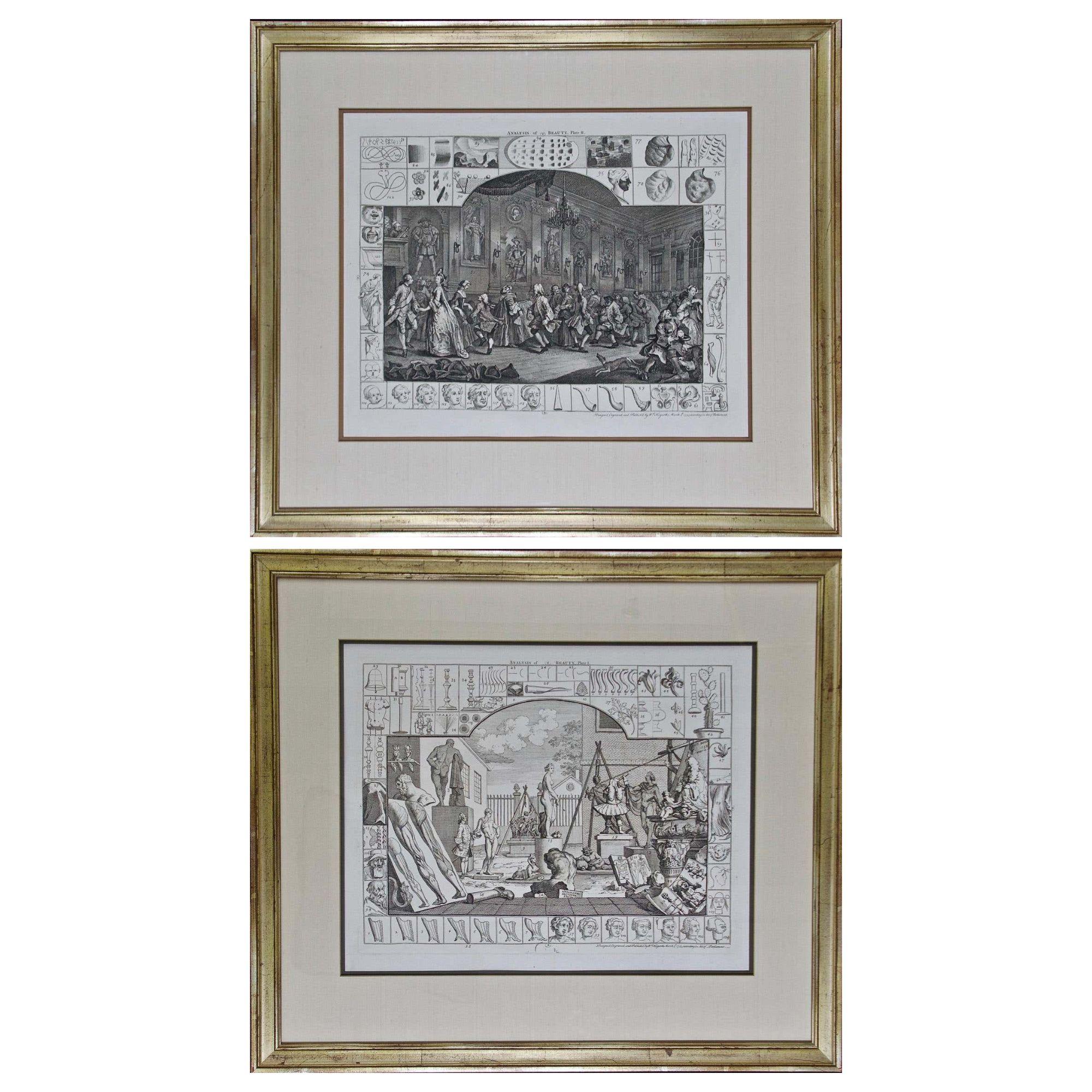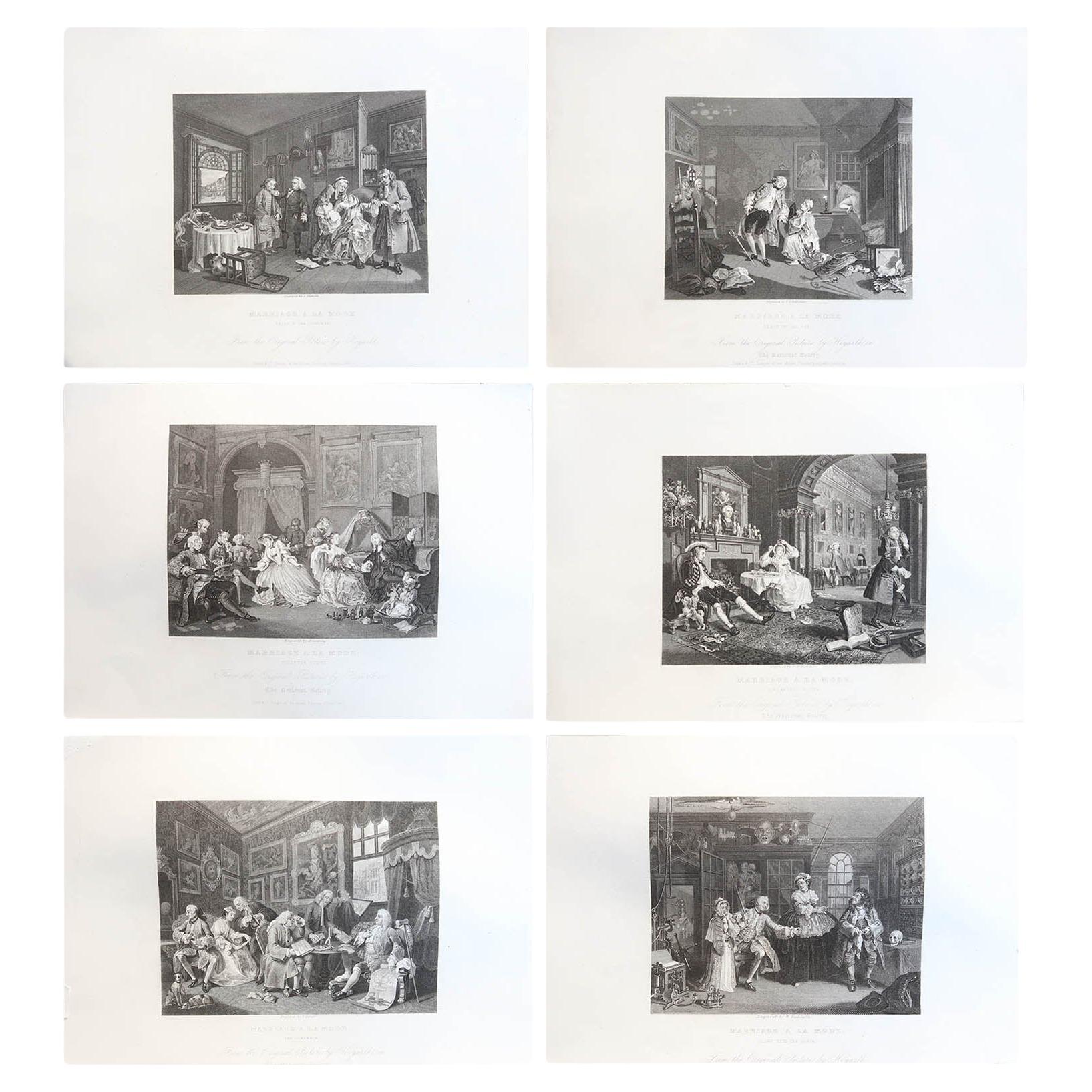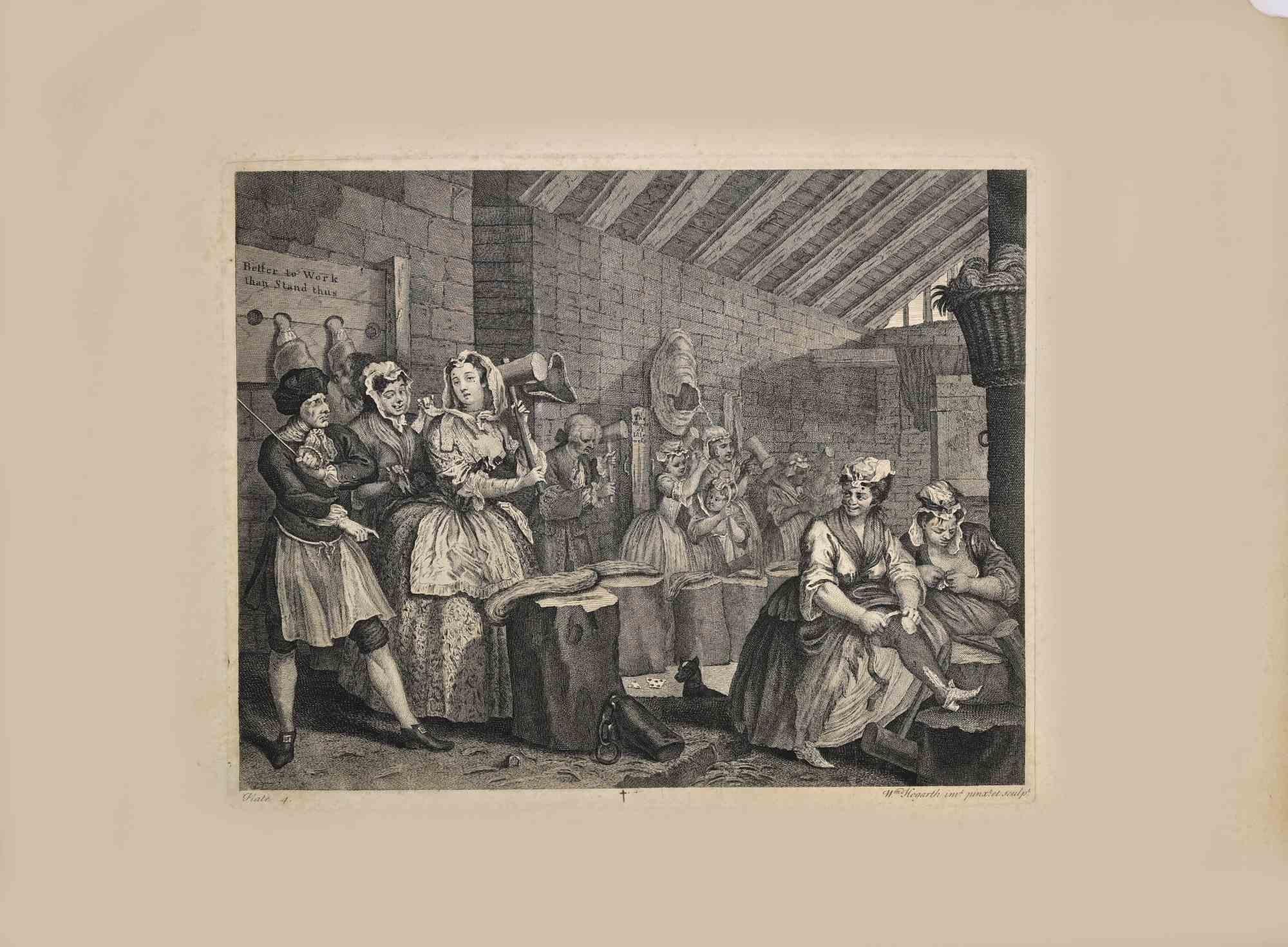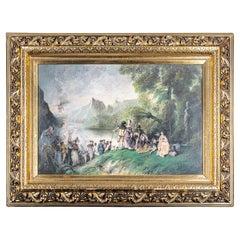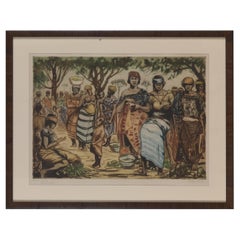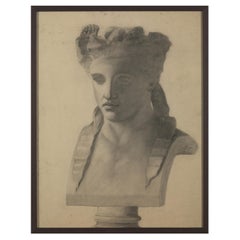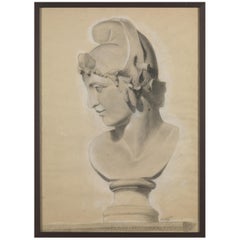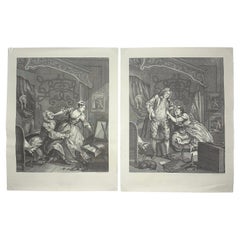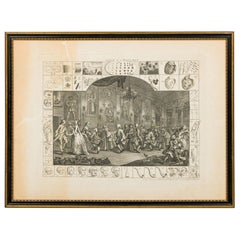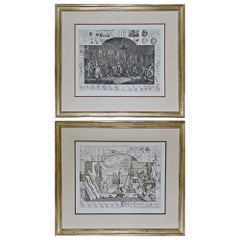Items Similar to William Hogarth, Harlot's Progress, Litographs with French Comments
Want more images or videos?
Request additional images or videos from the seller
1 of 7
William Hogarth, Harlot's Progress, Litographs with French Comments
$666.17
£493.51
€560
CA$916.28
A$1,019.16
CHF 534.65
MX$12,436.09
NOK 6,710.54
SEK 6,323.87
DKK 4,263.77
About the Item
About the artist
William Hogarth (10 November 1697 – 26 October 1764) was an English painter, printmaker, pictorial satirist, social critic, and editorial cartoonist. His work ranges from realistic portraiture to comic strip-like series of pictures called "modern moral subjects", He is perhaps best known for his series A Harlot's Progress, A Rake's Progress and Marriage A-la-Mode. Knowledge of his work is so pervasive that satirical political illustrations in this style are often referred to as "Hogarthian". Influenced by French and Italian painting and engraving, Hogarth's works are mostly satirical caricatures, sometimes bawdily sexual, mostly of the first rank of realistic portraiture. They became widely popular in his lifetime, and he was by far the most significant English artist of his generation.
About the lithography’s
This series of 6 graphics are based on ‘A Harlot’s Progress’. The series shows the story of a young women, M. Hackabout, who arrives in London from the country and becomes a prostitute. In the first scene, an old woman praises her beauty and suggests a profitable occupation. A gentleman is shown towards the back of the image. In the second image she is with two lovers: a mistress. In the third she has become a prostitute as well as arrested, she is beating hemp in Bridewell Prison in the fourth. In the fifth scene she is dying from venereal disease, and she is dead at age 23 in the last.
- Dimensions:Height: 55 in (139.7 cm)Width: 75 in (190.5 cm)Depth: 1 in (2.54 cm)
- Materials and Techniques:
- Place of Origin:
- Period:
- Date of Manufacture:Unknown
- Condition:Wear consistent with age and use.
- Seller Location:Leuven , BE
- Reference Number:Seller: 16661stDibs: LU3301120816742
About the Seller
5.0
Vetted Professional Seller
Every seller passes strict standards for authenticity and reliability
Established in 2017
1stDibs seller since 2017
172 sales on 1stDibs
Typical response time: 4 hours
- ShippingRetrieving quote...Shipping from: leuven, Belgium
- Return Policy
Authenticity Guarantee
In the unlikely event there’s an issue with an item’s authenticity, contact us within 1 year for a full refund. DetailsMoney-Back Guarantee
If your item is not as described, is damaged in transit, or does not arrive, contact us within 7 days for a full refund. Details24-Hour Cancellation
You have a 24-hour grace period in which to reconsider your purchase, with no questions asked.Vetted Professional Sellers
Our world-class sellers must adhere to strict standards for service and quality, maintaining the integrity of our listings.Price-Match Guarantee
If you find that a seller listed the same item for a lower price elsewhere, we’ll match it.Trusted Global Delivery
Our best-in-class carrier network provides specialized shipping options worldwide, including custom delivery.More From This Seller
View AllAfter Jean Antoine Watteau, Disembarkation for the Island of Cythera
Located in Leuven , BE
After Jean Antoine Watteau (Valenciennes, 1684-Nogent-sur-Marne, 1721), Disembarkation for the Island of Cythera, Pastel drawing, Framed, 19th or ...
Category
Antique 17th Century Unknown Decorative Art
Materials
Canvas
Kerels Henry, Kongo Indigenous Market, Etched and Colored
By Henri Kerels
Located in Leuven , BE
This authentic colored etch by Henry Ketels(1896-1956) depicts an indigenous market.
Measurements of this beautiful piece are 71.5 x 53 cm without frame, 91.5 x 72 cm with frame.
...
Category
20th Century Belgian Prints
Materials
Other
19th C, Drawing on Paper, Dated, Signed and Framed
Located in Leuven , BE
Unknown Academy Student 19th C Drawing, pencil on paper.
Category
Antique 19th Century Belgian Drawings
Materials
Paper
19th C, Academy Student Drawing, Pencil on Paper
Located in Leuven , BE
Framed, signed and dated.
Category
Antique 19th Century Belgian Neoclassical Decorative Art
Materials
Paper
19th C, Academy Student Drawing, Pencil on Paper
Located in Leuven , BE
Framed, signed and dated.
Category
Antique 19th Century Drawings
Materials
Paper
19th C, Academy Student Drawing, Pencil on Paper
Located in Leuven , BE
Framed, signed and dated.
Category
Antique 19th Century Belgian Neoclassical Decorative Art
Materials
Paper
You May Also Like
"A Harlot's Progress" Plate 3 Etching
By William Hogarth
Located in Houston, TX
Etching from the series titled "A Harlots Progress" by William Hogarth. The series consists of six paintings and engravings. The story is about a woman named M. Hackabout who arrived in London and started working as a prostitute. The third plate is of her getting arrest for her choice in profession. The series is a satirical story that emphasizes the dangers of being a prostitute and the health risks that come from it.
In 18th century engraving, the detail of the black mole on women and men's face is a symbol of the deadly venereal disease, syphilis. In this plate, Hackabout has already contracted the disease and that is why the black dot is visible on her forehead as well as her madam's.
In 1828, William Innell Clement published Harlot's Progress in columns on a single page of his newspaper Bell's Life in London #330. The detail with the cross seen in earlier reproductions of the engraving.
Dimensions without Frame: H 14.5 in x W 16.5 in.
Artist Biography: William Hogarth ( 10 November 1697 – 26 October 1764) was an English painter, printmaker, pictorial satirist, social critic, and editorial cartoonist. His work ranged from realistic portraiture to comic strip-like series of pictures called "modern moral subjects", perhaps best known to be his moral series A Harlot's Progress, A Rake's Progress and Marriage A...
Category
1730s Old Masters Figurative Prints
Materials
Etching
William Hogarth - 'Before and After' 2 Plate Etchings
By James Heath / William Hogarth
Located in Alpha, NJ
'Before and After' William Hogarth Etchings
Category
Antique 19th Century English Prints
Materials
Paper
$1,120 Sale Price / set
20% Off
William Hogarth English Georgian Framed Print of "Analysis of Beauty. Plate II"
Located in Queens, NY
English Georgian print of a scene with models and sculpture of classic figures also having center image of people gathering dancing in a circle within ...
Category
Antique 19th Century British Georgian Paintings
Materials
Paper
William Hogarth's "Analysis of Beauty": A Set of Two Framed 18th C. Engravings
By William Hogarth
Located in Alamo, CA
The two plates in this set were created utilizing both engraving and etching techniques by William Hogarth in 1753, originally as illustrations of his book on aesthetics, entitled "Analysis of Beauty". Due to their popularity, these plates were later published separately. The publication line in the lower right reads: "Designed, Engraved, and Publish'd by Wm. Hogarth, March 5th 1753, according to Act of Parliament." Hogarth's original copper plates were refurbished where needed by James Heath and engravings were republished in London in 1822 by Braddock, Cradock & Joy. This was the last time Hogarth's copper plates were used for printing. Most were melted during World War I for the construction of bombs.
These large folio sized "Analysis of Beauty" engravings are presented in antiqued gold-colored frames with double mats; the outer silk mats are light brown-colored and the inner mats are dark brown. Each frame measures 27.38" x 31.25" x 1.13". There is one tiny spot in the right margin of plate 1 and another in the lower margin; the latter could be from the printing process. The prints are otherwise in excellent condition.
The "Analysis of Beauty" series is in the collection of many major museums, including: The British Museum, The Metropolitan Museum of Art, The Tate Museum, The Chicago Art Institute and The Fine Arts Museums of San Francisco.
The first engraving (Plate 1) depicts a courtyard of statues which is filled with some of the most famous works of classical sculpture. The most important sculptures are surrounded by less impressive works. The Medicean Venus (#13) is in the center with a statue of Julius Caesar (#19) to the right, elevated on a pulley with a short, overdressed Brutus stands over the falling Caesar. The Apollo Belvedere (#12) is next. A judge stands to the right with his foot on a cherub (#16). Another crying cherub holds a gallows and wipes his tears with the judge's robe.
A sphinx (#21) and the drunken Silenus (#107) are below the Venus. Michaelangelo's torso (#54) and a statue of Antonius (#6) are seen in the foreground. The Farnese Hercules (#3) and a bust of another Hercules (#4) under two statuettes of Isis are also included in the scene.
The key to these objects is included in the form of a serpentine line winding around a cone (#26), Hogarth's "Line of Beauty". For Hogarth the winding line is an essential element of beauty in art. Hogarth's theory of beauty is communicated in this plate.
Plate 2 is thought to represent the Wanstead Assembly, with the Earl of Tynley and his household. It is an adaptation of a scene in the Happy Marriage series, which complements Hogarth's Marriage à la Mode...
Category
Mid-18th Century Old Masters Interior Prints
Materials
Engraving, Etching
Set of 6 Original Antique Prints After William Hogarth, "Marriage A La Mode"
By William Hogarth
Located in St Annes, Lancashire
Wonderful set of Hogarth prints
This is the " Marriage A La Mode " series typical of the satirical/political artwork of Hogarth
Steel engravings
Published by Jones & Co., Temple ...
Category
Antique 1840s English Rococo Prints
Materials
Paper
A Harlot's Progress - Etching after William Hogarth - 1732
By William Hogarth
Located in Roma, IT
A Harlot's Progress is an etching print realized after William Hogarth in 1732
Signature on the plate on the lower right.
Good conditions, with some foxing.
A Harlot's Progress" i...
Category
1730s Surrealist Figurative Prints
Materials
Etching
More Ways To Browse
Harlot Hands
Glass Mosaic Panels
Portuguese Tile Mural
Delft Tile Set
Azulejo Mural
Copper Relief Panel
Crochet Wall Art
Delft Blue And White Wall Tiles
Zodiac Wall Art
Antique Ceramic Wall Plaques
Pressed Botanicals
Ceramic Fish Tile
Limoges Enamel Plaque
Majolica Lizard
Palissy Fish Platter
Italian Framed Marble Mosaic
Rosenthal Wall Plates
Pietra Dura Plaque
